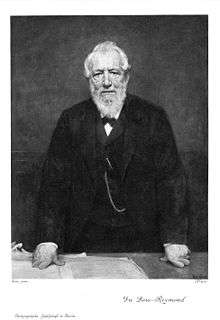Ignoramus et ignorabimus
The Latin maxim ignoramus et ignorabimus, meaning "we do not know and will not know," represents the idea that scientific knowledge is limited. It was popularized by Emil du Bois-Reymond, a German physiologist, in his 1872 address "Über die Grenzen des Naturerkennens" ("The Limits of Science.")[1]

Seven World Riddles
Emil du Bois-Reymond first used the words "Ignoramus" and "Ignorabimus" at the close of his keynote address to the 1872 Congress of German Scientists and Physicians. As he saw it, science was bounded by two limits: the ultimate nature of matter and the enigma of consciousness. Eight years later, in a speech before the Prussian Academy of Sciences, he expanded his list of conundrums to seven "world riddles" or "shortcomings" or science.[2] Three of these he declared to be "transcendent," or permanently unknowable:
"1. the ultimate nature of matter and energy, 2. the origin of motion, ... 5. the origin of simple sensations."[3]
Hilbert's reaction
David Hilbert, a widely-respected German mathematician, suggested that such a conceptualization of human knowledge was too pessimistic, and that by considering questions unsolvable we limit our understanding.
In 1900, during an address to the International Congress of Mathematicians in Paris, Hilbert suggested that answers to problems of mathematics are possible with human effort. He declared, "in mathematics there is no ignorabimus,"[4] and he worked with other formalists to establish foundations for mathematics during the early 20th century.[5][6]
On 8 September 1930, Hilbert elaborated his opinion in a celebrated address to the Society of German Scientists and Physicians, in Königsberg:[7]
We must not believe those, who today, with philosophical bearing and deliberative tone, prophesy the fall of culture and accept the ignorabimus. For us there is no ignorabimus, and in my opinion none whatever in natural science. In opposition to the foolish ignorabimus our slogan shall be Wir müssen wissen – wir werden wissen ("We must know — we will know.")[8]
Answers to some of Hilbert's Program of 23 problems were found during the 20th century. Some have been answered definitively; some have not yet been solved; a few have been shown to be impossible to answer with mathematical rigor.
In 1931, Gödel's incompleteness theorems showed that some mathematical questions cannot be answered in the manner we would usually prefer.
Other responses
The sociologist Wolf Lepenies discussed the Ignorabimus with the opinion that du Bois-Reymond was not really pessimistic about science:[9]
...it is in fact an incredibly self-confident support for scientific hubris masked as modesty...
This was in regards to Friedrich Wolters, one of the members of the literary group "George-Kreis." Lepenies thought that Wolters misunderstood the degree of pessimism being expressed about science, but understood the implication that scientists themselves could be trusted with self-criticism.
Lepenies was repeating the criticism, first leveled in 1874 by du Bois-Reymond's rival Ernst Haeckel, that the “seemingly humble but actually presumptuous Ignorabimus is the Ignoratis of the infallible Vatican and of the ‘Black International’ which it heads.”[10] Haeckel overstated his charge: du Bois-Reymond had never supported the Catholic Church,[11] and far from professing humility he reminded his audience that while our knowledge was indeed bounded by mysteries of matter and mind, within these limits “the man of science is lord and master; he can analyze and synthesize, and no one can fathom the extent of his knowledge and power.”[12]
In response to his critics du Bois-Reymond modified his watchword in "The Seven World Riddles" (1880) to that of "Dubitemus" ("We doubt it.")[13]
The issue of whether science has limits continues to attract scholarly attention.[14][15][16][17][18]
See also
- Acatalepsy
- Hubris
- I know that I know nothing
- Ignorance management
- Ignotum per ignotius
- List of Latin phrases
- Strong agnosticism
- Unknown unknown
Notes
- du Bois-Reymond, Emil (1912). du Bois-Reymond, Estelle (ed.). Reden. 1. Leipzig: Veit. pp. 441–473.
- du Bois-Reymond, Emil (1912). du Bois-Reymond, Estelle (ed.). Reden. 2. Lepzig: Veit. pp. 65–98.
- William E. Leverette Jr., E. L. Youmans' Crusade for Scientific Autonomy and Respectability, American Quarterly, Vol. 17, No. 1. (Spring, 1965), pg. 21.
- D. Hilbert (1902). "Mathematical Problems: Lecture Delivered before the International Congress of Mathematicians at Paris in 1900". Bulletin of the American Mathematical Society. 8: 437–79. doi:10.1090/S0002-9904-1902-00923-3. MR 1557926.
- McCarty, David C. (October 2005). "Problems and riddles: Hilbert and the du Bois-Reymonds". Synthese. 147 (1): 63–79. doi:10.1007/s11229-004-6207-5. ISSN 0039-7857.
- Reichenberger, Andrea (2019). "From Solvability to Formal Decidability: Revisiting Hilbert's "Non-Ignorabimus"". https://scholarship.claremont.edu/jhm/vol9/iss1/5. 9 (1): 49–80. External link in
|journal=(help) - Lepenies, Wolf (1988). Between Literature and Science: the Rise of Sociology. Cambridge, UK: Cambridge University Press. p. 272. ISBN 0-521-33810-7.
- Haeckel, Ernst (1874). Anthropogenie, oder, Entwicklungsgeschichte des Menschen. Gemeinverständliche wissenschaftlich Vorträge über die Grundzüge der menschlichen Keimes- und Stammes-Geschichte. Leipzig: Wilhelm Engelmann. pp. xiii. ISBN 3957384257.
- Finkelstein, Gabriel (2013). Emil du Bois-Reymond: Neuroscience, Self, and Society in Nineteenth-Century Germany. Cambridge, Massachusetts; London, England: The MIT Press. pp. 281–282. ISBN 978-1-4619-5032-5. OCLC 864592470.
- du Bois-Reymond, Emil (1912). du Bois-Reymond, Estelle (ed.). Reden. 1. Leipzig: Veit. p. 460.
- du Bois-Reymond, Emil (1912). du Bois-Reymond, Estelle (ed.). Reden. 2. Leipzig: Veit. p. 83.
- Vidoni, Ferdinando (1991). Ignorabimus!: Emil du Bois-Reymond und die Debatte über die Grenzen wissenschaftlicher Erkenntnis im 19. Jahrhundert. Frankfurt am Main: Peter Lang. ISBN 3-631-43339-5. OCLC 31070756.
- Tennant, Neil (1 November 2007). "Mind, mathematics and the Ignorabimusstreit". British Journal for the History of Philosophy. 15 (4): 745–773. doi:10.1080/09608780701605036. ISSN 0960-8788.
- Bayertz, Kurt; Gerhard, Myriam; Jaeschke, Walter, eds. (2012). Der Ignorabimus-Streit. Hamburg: Felix Meiner. ISBN 3-7873-2158-6. OCLC 819620680.
- Rescher, Nicholas (1999). The limits of science (Revised ed.). Pittsburgh, Pennsylvania: University of Pittsburgh Press. ISBN 978-0-8229-7206-8. OCLC 891385628.
- Horgan, John (2015). The end of science: facing the limits of knowledge in the twilight of the scientific age. Lenzo, Jack. New York, New York: Basic Books. ISBN 978-0-465-05085-7. OCLC 905920357.